★★★½
“I can only apologize.”
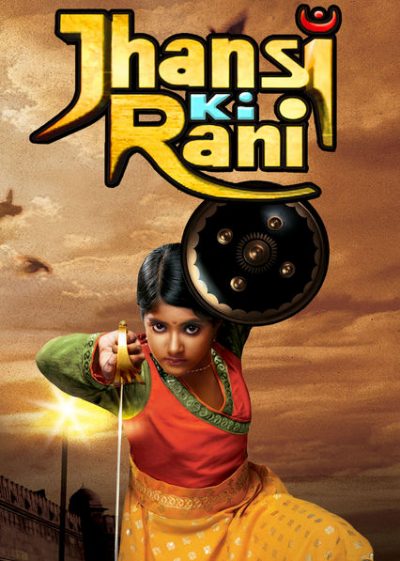 Not for the show, I should stress. But as a Brit… Wow, were were really such utter bastards to the Indians when the country was a colony? I was under the impression it was all tea and cricket. But the British, as depicted here, appear largely to be working entirely for the East Indian company, treating the local population with, at best, disdain, and often brutality. All the while, seeking to manipulate local politics (with, it must be said, the help of some Indians) to their own advantage. After 70 episodes of this, such is the guilt, I can barely enjoy my chicken tikka masala without giving it reparations.
Not for the show, I should stress. But as a Brit… Wow, were were really such utter bastards to the Indians when the country was a colony? I was under the impression it was all tea and cricket. But the British, as depicted here, appear largely to be working entirely for the East Indian company, treating the local population with, at best, disdain, and often brutality. All the while, seeking to manipulate local politics (with, it must be said, the help of some Indians) to their own advantage. After 70 episodes of this, such is the guilt, I can barely enjoy my chicken tikka masala without giving it reparations.
I say 70 episodes, but the entire series is considerably longer. Wikipedia lists it as 408, but those are apparently 25-minute shows. Netflix seems to have doubled it up (bringing its length into line with the more traditional Hispanic telenovelas which I’ve previously reviewed). Yet even allowing for that, to this point they only seem to have about 30% of the show. They also shortened the title from its full name, Ek Veer Stree Ki Kahaani… Jhansi Ki Rani, which translates as Story of a Brave Woman… The Queen of Jhansi.
Simply based on the level of intrigue here, this feels like an Indian version of Game of Thrones. Albeit without the incest. Or the dragons. Or the budget. And is based on a real character, Lakshmibai. But it’s quite easy also to draw a line between Arya Stark and the teenage heroine here, Manikarnika (Gupta) a.k.a. Manu, neither caring one bit for ‘traditional’ behaviour. Manu, in particular, objects to the occupying British forces and their disrespectful treatment of the native population. So she crafts a secret identity, Kranti Guru, and uses this to fight back against the Brits, even (gasp!) desecrating the Union Jack. She’s helped by her mentor, Tatya Tope, who occasionally dons the mask as well, when necessary.
However, a literally stellar horoscope leads to Manu being betrothed to the Maharaja of Jhansi, Gangadhar Rao (Dharmadhikari). And this is my biggest issue. Cultural differences be damned, there is no way in which a prepubescent girl marrying a middle-aged man can seem appropriate, or other than incredibly creepy. Manu gets her first period in one of the final episodes, and the reaction of everyone can be summarised as, “Good, now you can give the king a heir.” [The reality was slightly less creepy: Lakshmibai did, indeed, marry the king at age 13. However, they didn’t have a son until she was in her twenties]
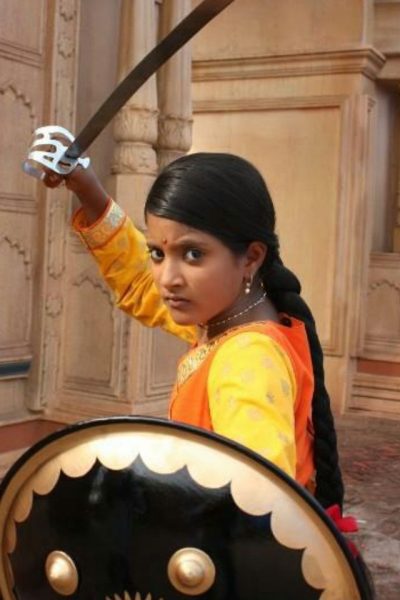 The British – already unhappy with Manu’s rebellious outbursts – are far from happy at the prospect of her marrying Gangadhar and continuing the line. Even before she arrives at the palace, there are backroom conspiracies involving some of his relatives (not least his own mother), who ally themselves with the colonialists for their mutual benefit. These schemes go up to and include multiple assassination plots against the king, and indeed, his bride-to-be. Time for Kranti Guru to come out again, particularly to face off against gold-toothed British psychopath Marshall (Verma). His relentless pursuit, without regard for who gets hurt, earns him Manu’s undying enmity. [Weirdly, he’s played by an Indian actor in “white face”, as are some – but not all – of the other English officers, some of whom are dubbed.]
The British – already unhappy with Manu’s rebellious outbursts – are far from happy at the prospect of her marrying Gangadhar and continuing the line. Even before she arrives at the palace, there are backroom conspiracies involving some of his relatives (not least his own mother), who ally themselves with the colonialists for their mutual benefit. These schemes go up to and include multiple assassination plots against the king, and indeed, his bride-to-be. Time for Kranti Guru to come out again, particularly to face off against gold-toothed British psychopath Marshall (Verma). His relentless pursuit, without regard for who gets hurt, earns him Manu’s undying enmity. [Weirdly, he’s played by an Indian actor in “white face”, as are some – but not all – of the other English officers, some of whom are dubbed.]
To be honest, Manu’s action scenes are a bit crap, mostly consisting of her waving a sword around in severely choreographed battles. She’d last about two minutes against other teenage warrioresses, like Hanna or Hit-Girl. Still, she has a certain charm, not least for her razor-sharp intellect, which lets her argue with – and usually kick the mental ass of – religious scholars, politicians and the king. She also has an unshakeable faith that everyone is redeemable, and more than once, turns enemies into loyal allies. Most notable is dacoit (bandit) Samar Singh, initially hired to murder Manu. When the tables are turned, and she forgives him, he abandons his life of crime. That’s the level of devotion she inspires.
Run away, foreigner, run away!
This brave Manu riding the horse is Lakshmi Bai
Fire will rain on you, now you are doomed.
Look at the colourful India, India will defeat you.
She has come to claim your head, the Queen of Jhansi has come.
Run away foreigner, the Queen of Jhansi has come!
Despite its origins, there are no song-and-dance numbers, though the music still plays a significant, if repetitive part. The song quoted above shows up in every other episode, and the re-use of certain cues could be turned into a drinking game, e.g. take a shot every time that “sad trombone”-like arpeggio sting is heard. However, the most defining style element is the reaction shot. It seems nothing dramatic can happen without everyone present in the scene subsequently being ready for their close-up – sometimes multiple times. And considering how often such moments happen in the king’s court… it takes a while. This does lighten the intellectual burden required to keep up. Chris was usually present for only about one-third of the screen time each day, yet she was able to hang in there, with only minor explanations from me.
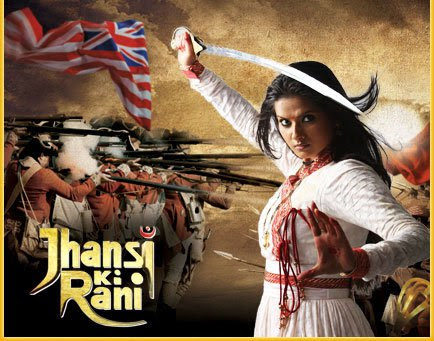 For the great majority of the time, it’s light stuff, with Manu escaping every pitfall her enemies set for her. Then, the hammer drops: to extend the GoT comparison, it’s the Rani equivalent of the Red Wedding. Fewer bodies, to be sure – just one – yet the resulting emotional wallop was still brutal, sending me through multiple stages of grief during the subsequent fall-out. “No… Surely they haven’t… It’s got to be a dream sequence.” All told, it was easily the most impactful death in any of the telenovelas I’ve watched, regardless of their origin, and the repercussions ran on for multiple episodes. As do the reaction shots. So. Many. Reaction. Shots.
For the great majority of the time, it’s light stuff, with Manu escaping every pitfall her enemies set for her. Then, the hammer drops: to extend the GoT comparison, it’s the Rani equivalent of the Red Wedding. Fewer bodies, to be sure – just one – yet the resulting emotional wallop was still brutal, sending me through multiple stages of grief during the subsequent fall-out. “No… Surely they haven’t… It’s got to be a dream sequence.” All told, it was easily the most impactful death in any of the telenovelas I’ve watched, regardless of their origin, and the repercussions ran on for multiple episodes. As do the reaction shots. So. Many. Reaction. Shots.
I wonder if the 70-episode cutoff point was chosen by Netflix, being the point at which Manu “grows up”. It appears she is played by an older actress (right) in the latter stages of the series. As it stands, however, it’s an interesting approach to have a series apparently aimed at adults, with a 14-year-old character as the lead. While I can’t say it was wholly successful, it proved a remarkably easy watch, and I was genuinely sorry when I ran out of episodes.
Creative Director: Sujata Rao
Star: Ulka Gupta, Sameer Dharmadhikari, Vikas Verma, Ashnoor Kaur





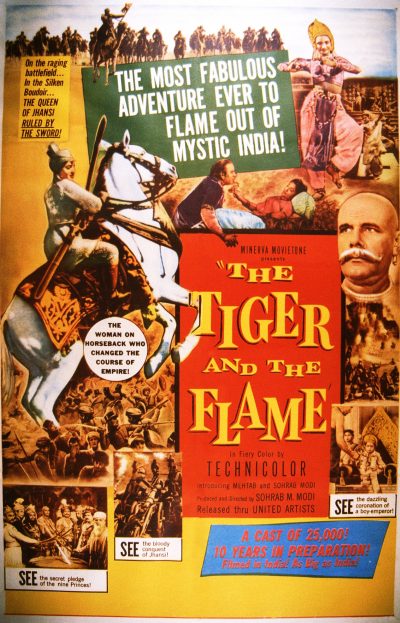
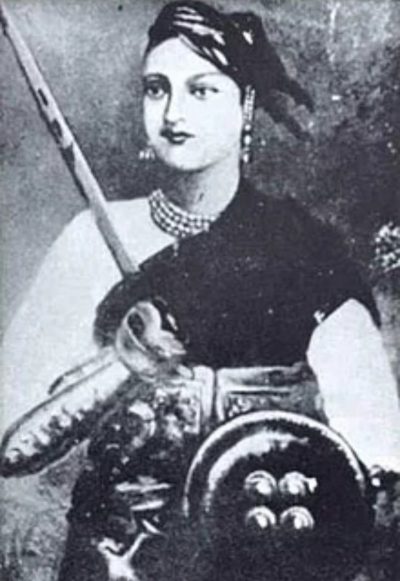 The notion of a warrior woman, who leads the fight against occupying forces is something which quite a common trope of legend and lore worldwide. The family tree includes the likes of
The notion of a warrior woman, who leads the fight against occupying forces is something which quite a common trope of legend and lore worldwide. The family tree includes the likes of 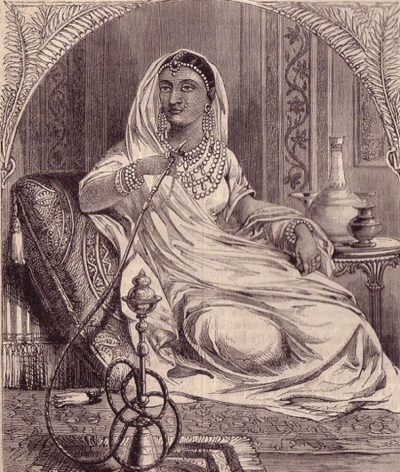 In June 1857, rebel soldiers seized the fort at Jhansi and massacred, not only the officers garrisoned there, but their families. After the rebels left, Lakshmibai took over, running Jhansi on behalf of the British until they could send a superintendent. That’s not exactly Joan of Arc-like… Instead, she fought off efforts by the rebels to claim the Jhansi throne for her husband’s nephew, as well as an attempted invasion by neighbouring states. It’s possible the latter enemy’s alliance with the British helped sour relations between them and Lakshmibai, though she still seems to have intended to act as a caretaker to this point.
In June 1857, rebel soldiers seized the fort at Jhansi and massacred, not only the officers garrisoned there, but their families. After the rebels left, Lakshmibai took over, running Jhansi on behalf of the British until they could send a superintendent. That’s not exactly Joan of Arc-like… Instead, she fought off efforts by the rebels to claim the Jhansi throne for her husband’s nephew, as well as an attempted invasion by neighbouring states. It’s possible the latter enemy’s alliance with the British helped sour relations between them and Lakshmibai, though she still seems to have intended to act as a caretaker to this point. Her post-rebellion legacy was a complex one. Some English writers maligned Lakshmibai, blaming her for the massacre by the rebels at Jhansi – in particular army doctor, Thomas Lowe, who called the queen the “Jezebel of India.” However, Sir Hugh Rose, commander of the British forces who took Jhansi spoke of her in much kinder terms, calling her “Personable, clever and beautiful,” “The most dangerous of all Indian leaders,” and “The bravest and best military leader of the rebels”.
Her post-rebellion legacy was a complex one. Some English writers maligned Lakshmibai, blaming her for the massacre by the rebels at Jhansi – in particular army doctor, Thomas Lowe, who called the queen the “Jezebel of India.” However, Sir Hugh Rose, commander of the British forces who took Jhansi spoke of her in much kinder terms, calling her “Personable, clever and beautiful,” “The most dangerous of all Indian leaders,” and “The bravest and best military leader of the rebels”. Another solid Pearl Chang movie – despite being mis-labelled as Wolf Devil Woman 3, it is in now way related to
Another solid Pearl Chang movie – despite being mis-labelled as Wolf Devil Woman 3, it is in now way related to 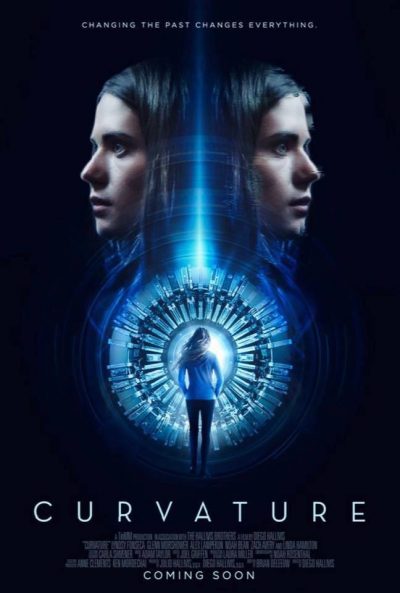 Helen (Fonseca) is struggling to come to terms with the sudden, unexpected death of her scientist husband, who was engaged on a top-secret project with his partner, Tomas (Morshower). Then things get truly weird: she experiences the mother of all blackouts, missing an entire week, and shortly afterward, Helen receives a phone-call warning her to get out of her house… from herself. It turns out, husband and Tomas had come up with a limited form of time-travel. As a result of this and subsequent events, there are now
Helen (Fonseca) is struggling to come to terms with the sudden, unexpected death of her scientist husband, who was engaged on a top-secret project with his partner, Tomas (Morshower). Then things get truly weird: she experiences the mother of all blackouts, missing an entire week, and shortly afterward, Helen receives a phone-call warning her to get out of her house… from herself. It turns out, husband and Tomas had come up with a limited form of time-travel. As a result of this and subsequent events, there are now 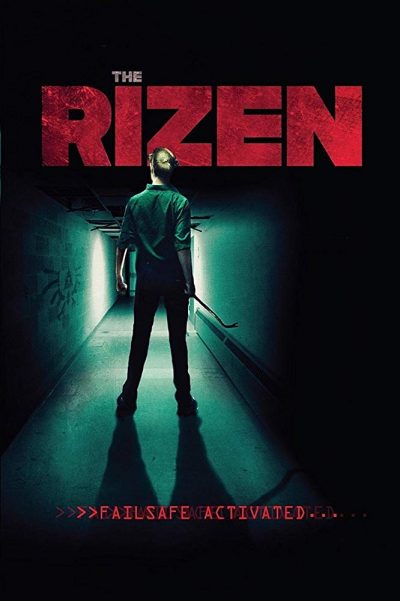 This is about the third Lovecraftian film I’ve seen with a heroine in the past year or so, after
This is about the third Lovecraftian film I’ve seen with a heroine in the past year or so, after 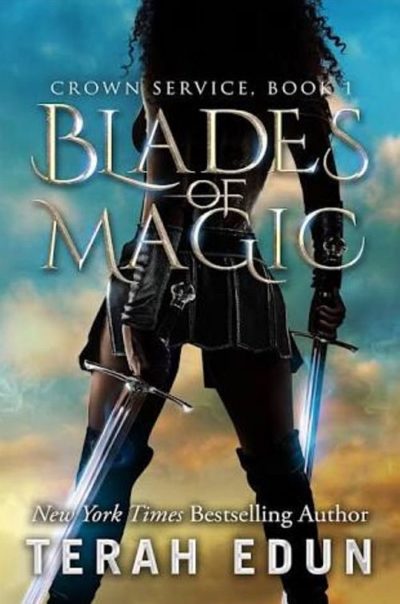 Seventeen-year-old Sarah Fairchild and her family have become persona non grata after her father’s execution by the Algardis Empire. He was a renowned fighter and commander, so his alleged desertion makes no sense to Sarah. Regardless, his wife and daughter are now pariahs to the local community. Even with Sarah’s unparalleled fighting skills, both natural and magical, her employment opportunities are limited, to say the least.
Seventeen-year-old Sarah Fairchild and her family have become persona non grata after her father’s execution by the Algardis Empire. He was a renowned fighter and commander, so his alleged desertion makes no sense to Sarah. Regardless, his wife and daughter are now pariahs to the local community. Even with Sarah’s unparalleled fighting skills, both natural and magical, her employment opportunities are limited, to say the least. China seems to have discovered SF in a big way of late, most recently with The Wandering Earth, the biggest blockbuster you’ve probably never heard of. At time of writing, it’s the #7 film at the world-wide box-office this year, though 99% of its tally came in its home country. A couple of years earlier, this film made much less impact, yet for me is superior. It’s a time-travel piece, not dissimilar to Run Lola Run, with a triptych repeating the same events in three different ways, as the heroine strives to achieve a satisfactory outcome.
China seems to have discovered SF in a big way of late, most recently with The Wandering Earth, the biggest blockbuster you’ve probably never heard of. At time of writing, it’s the #7 film at the world-wide box-office this year, though 99% of its tally came in its home country. A couple of years earlier, this film made much less impact, yet for me is superior. It’s a time-travel piece, not dissimilar to Run Lola Run, with a triptych repeating the same events in three different ways, as the heroine strives to achieve a satisfactory outcome.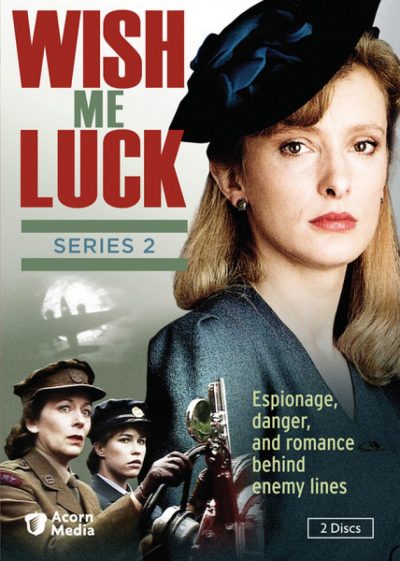 This British TV series ran for three series from 1988 through 1990, with 23 episodes (each an hour long including commercials) in total. The same creators had previously been responsible for another WW2-based show, Tenko, about women in a Japanese prisoner-of-war camp after the fall of Singapore. The time period here is similar – the second half of World War 2 – but the focus moves from the Far East to Occupied Europe, in particular, France. At this point, the Allies were sending in agents to assist the local Resistance – and as
This British TV series ran for three series from 1988 through 1990, with 23 episodes (each an hour long including commercials) in total. The same creators had previously been responsible for another WW2-based show, Tenko, about women in a Japanese prisoner-of-war camp after the fall of Singapore. The time period here is similar – the second half of World War 2 – but the focus moves from the Far East to Occupied Europe, in particular, France. At this point, the Allies were sending in agents to assist the local Resistance – and as 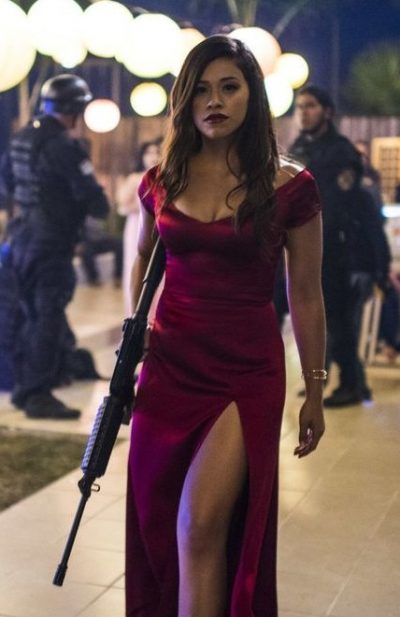 As the lazy joke goes, I preferred this film the first time I saw it, when it was called… Well, actually, it was called
As the lazy joke goes, I preferred this film the first time I saw it, when it was called… Well, actually, it was called